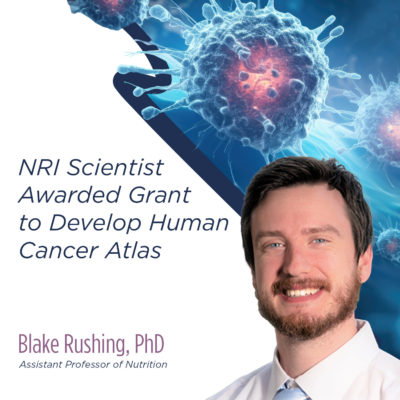Blake Rushing, PhD, an assistant professor of Nutrition at the UNC Nutrition Research Institute (NRI), has been awarded a $3.9M R01 grant from the National Cancer Institute to develop a groundbreaking Human Cancer Metabolome Atlas. This project aims to map the complex metabolic processes that drive cancer progression, treatment resistance, and more in human tumors.
Rushing’s commitment to this research is deeply personal. “Like many people, I have had friends and family affected by cancer,” he shares. “Some of those are cancer survivors, and I want to see a world where everyone can have that outcome. This research will contribute to our knowledge of many types of cancers and potentially help in getting the right treatment to the right patient.”
The Human Cancer Metabolome Atlas will serve as a vital resource for researchers, providing a detailed metabolic profile of various types of cancer. By cataloging how cancer cells alter their metabolism to survive and thrive, this project will help identify new targets for therapies and improve our understanding of cancer biology. This research has the potential to lead to more effective treatments and ultimately improve outcomes for individuals with cancer.
Rushing describes this grant as a significant milestone in his career. “Getting this grant is probably the most exciting event of my career to date,” he shares. “R01 grants are often considered the ‘gold standard’ for faculty in the biomedical sciences, and getting the first R01 grant is a major event in one’s career.” He emphasizes that obtaining this grant is particularly challenging, requiring years of preliminary data, publications, and expertise. “I feel very fortunate to have reached this milestone so early and to have so much of my career left in front of me to continue to reach new heights,” Rushing adds.
The heart of Rushing’s project lies in understanding how cancer cells reprogram their metabolism to support their rapid growth and survival. “Reprogramming of metabolism is one of the most well-established hallmarks of cancer,” he explains. These changes help cancer cells initiate, grow, develop resistance to drugs, and evade the immune system – the body’s defense mechanism against disease. By studying these metabolic changes, Rushing aims to uncover new therapeutic targets and biomarkers—biological indicators of disease—that could guide cancer detection and treatment.
One of the key challenges in cancer treatment is the significant variation in metabolism among tumors, even within the same type of cancer. This variability, known as tumor heterogeneity, makes it difficult to treat all patients with a one-size-fits-all approach. “Understanding the landscape of tumor metabolic heterogeneity provides an opportunity to advance precision oncology, where patients can be categorized by tumor metabolic profiles and given more tailored treatment programs,” says Rushing.
Despite the recognized importance of investigating tumor metabolism, there has been no large-scale effort to create a comprehensive cancer metabolome resource that explores how metabolism varies among patients and links these differences to genetic characteristics. “As a national public resource, this atlas will allow researchers to make metabolism-related discoveries for tumors of many types at a scale that has never been done before,” Rushing explains. This resource could lead to the discovery of new mechanisms of disease, similarities and differences between tumor types, and new strategies for precision oncology and treatment.
Rushing credits his success to the mentors who guided him throughout his career. He acknowledges several key figures, including his PhD advisor Mustafa Selim, PhD, at East Carolina University (ECU), who sparked his interest in cancer biology, pharmacology, and toxicology. He also highlights the influence of his postdoctoral mentor Brandon Garcia, PhD, who deepened his expertise in drug discovery and biochemistry, and Susan Sumner, PhD, at the NRI, who provided him opportunities to learn and employ cutting-edge metabolomics, the study of chemical processes involving metabolites, in health and disease.
“Mentorship is such a crucial component in one’s career,” Rushing reflects. “This R01 allows me to bring together my training in cancer biology and pharmacology/toxicology with metabolomics technologies to create a new national resource—the Human Cancer Metabolome Atlas.”
Rushing’s work is not only a significant contribution to the scientific community but also a personal mission to make a difference in the fight against cancer. “I am extremely glad to make this contribution to the greater research community to aid in the fight against cancer,” he concludes.

